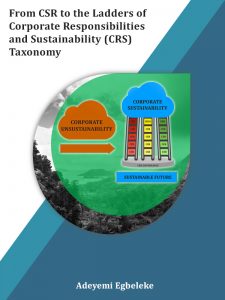Press Release

New Book Inspires Paradigm Change; an End to Era of “Corporate Social Responsibility”
Adeyemi Egbeleke’s ‘From CSR to the Ladders of Corporate Responsibilities and Sustainability (CRS) Taxonomy’ reaches beyond the corporate landscape to attempt to affect all facets of society, rendering the traditional CSR culture as obsolete, and making way for a new model that is more sustainable, human-centric and positive to humanity as a whole.
Contact:
Adeyemi Egbeleke
Email: contact@esgmonitor.uk
FOR IMMEDIATE RELEASE
United Kingdom – Adeyemi Egbeleke’s new book, ‘From CSR to the Ladders of Corporate Responsibilities and Sustainability (CRS) Taxonomy’ is one of the most profound and authoritative texts of its kind – putting the traditional CSR model under a microscope and proving that, while not obsolete, there is a dire need to shift to something more sustainable and ultimately good for the planet.
Synopsis:
From CSR to the Ladders of Corporate Responsibilities and Sustainability (CRS) Taxonomy marks an end of the era, which defined or described the business and society relationships as Corporate Social Responsibility (CSR)? The book has attempted a reconciliation between two diverse perspectives; one that considers the CSR obsolete and the other that claims the continued existence of the “Almighty CSR.” According to the author, this term “almighty CSR” entails that CSR, is, in fact, the answer to all business-society relationship problems. The reconciliation of views on whether CSR is an obsolete concept or dead has subsequently resulted in the author’s creation of the Ladders of CRS Taxonomy. Again, one can safely infer that previous works of the current author on ethics, CSR and corporate responsibilities and sustainability themes present profound influence on the creation of CRS taxonomy. Correspondingly, several readers would find the theoretical and practical cases used towards building arguments in support of the creation of CRS taxonomy informative. As they would be able, to relate to the reviewed business CRS performance cases and, in turn, this would help them gain insight on how CRS taxonomy ladders contribute towards achieving the globally sustainable development goals. The author’s perspective in this debate on the CSR’s future is evident, from the preface and pronounced across the five chapters of the book. The author is of the opinion that CSR as a concept is not dead, but in fact, there is an impending need for it to transform to conform to the present time’s sustainability demands. Evidently, CSR has not helped to resolve many of the broader society sustainability issues as regards – financial, social and environmental issues. Thus, the book is championing a clear boundary and a logical conceptual explanation of corporate responsibilities to contemporary multidimensional society. Furthermore, the ladders of CRS taxonomy categorization of corporate responsibilities offer a transformative path for achieving corporate sustainability. Therefore, recommend the book for public organizations and business enterprises managers and leaders, academics, students and other individuals interested in the general knowledge of corporate responsibilities and sustainability.
“The issue is that, in their attempts for economic growth, most Governments turn a blind eye to the destructive practices of corporations, who exist only to increase their profits,” explains the author. “This compromises human development and environmental protection – and profit becomes the only measure of success.”
Continuing, “This has put humanity and our planet in a rut of fierce unsustainability – everything from corporate fraud to pollution on an astronomical scale. My book shows the way we must move forward; a transformative pathway from a brown economy to a green one. I explain it all, and hope people will read it and then be empowered to take action.”
‘From CSR to the Ladders of Corporate Responsibilities and Sustainability (CRS) Taxonomy’ is available now, in paperback, eBook and audiobook formats: https://www.esgmonitor.uk/.
About the Author:
Adeyemi ( Yemi) obtained his postgraduate degree in international development management from University of Bradford department for economics and development studies in the UK. Bachelor degree in Geography – environmental resources planning and management major from Lagos state university, national diploma in maths and statistics from the polytechnics of Ibadan in Nigeria, and professional studies that include certification in business accounting from the chartered institute of management accountants, London. Yemi is a former fellow of Northern Leadership Academy in business and organizational survival and sustainability held at the University of Huddersfield, in the UK with research focused on innovation of transnational companies trading strategies towards making sourcing and brand more ethical in outlook to consumers. He was a fellow of the International Banking Institute in St.Petersburg on Modelling for Risk and Safety in Complex Systems and National Academy of Public Administration in Washington, D.C. He has experiences of working for public and private sector organizations that include Walmart, a global multinational retail company and participated in the UN Study programme to Proposed New Ways to Strengthens United Nations Capability for Collective Actions at the Office of the Director General-UN Office in Geneva.
